Related Research Articles
Berkeley DB (BDB) is an embedded database software library for key/value data, historically significant in open source software. Berkeley DB is written in C with API bindings for many other programming languages. BDB stores arbitrary key/data pairs as byte arrays, and supports multiple data items for a single key. Berkeley DB is not a relational database, although it has database features including database transactions, multiversion concurrency control and write-ahead logging. BDB runs on a wide variety of operating systems including most Unix-like and Windows systems, and real-time operating systems.
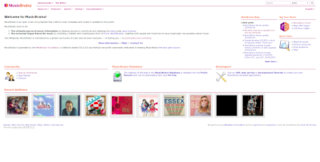
MusicBrainz is a MetaBrainz project that aims to create a collaborative music database that is similar to the freedb project. MusicBrainz was founded in response to the restrictions placed on the Compact Disc Database (CDDB), a database for software applications to look up audio CD information on the Internet. MusicBrainz has expanded its goals to reach beyond a CD metadata storehouse to become a structured online database for music.
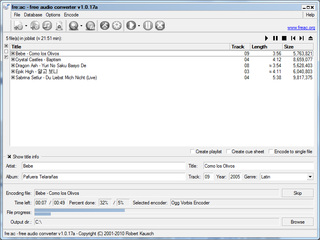
A CD ripper, CD grabber, or CD extractor is software that rips raw digital audio in Compact Disc Digital Audio (CD-DA) format tracks on a compact disc to standard computer sound files, such as WAV or MP3.

Loca Records is a British independent electronica and post rock record label based in Brighton, England. All the music, artwork and videos are released under copyleft licenses and distributed physically on vinyl, CD, and cassette. Inspired by the free software movement, Loca Records allows similar freedoms as the GNU General Public License on their releases, including copying, re-release, modification, and sampling, with the requirement that the new work uses the same license.

K3b is a CD, DVD and Blu-ray authoring application by KDE for Unix-like computer operating systems. It provides a graphical user interface to perform most CD/DVD burning tasks like creating an Audio CD from a set of audio files or copying a CD/DVD, as well as more advanced tasks such as burning eMoviX CD/DVDs. It can also perform direct disc-to-disc copies. The program has many default settings which can be customized by more experienced users. The actual disc recording in K3b is done by the command line utilities cdrecord or cdrkit, cdrdao, and growisofs. As of version 1.0, K3b features a built-in DVD ripper.

CDex is a free software package for Digital Audio Extraction from Audio CD and audio format conversion for Microsoft Windows. It converts CDDA tracks from a CD to standard computer sound files, such as WAV, MP3, or Ogg Vorbis. CDex was previously released as free software under the terms of the GNU General Public License (GPL); however, although the website claims that this is still the case, no source code has been released since 2005. It was originally written by Albert L. Faber, and is developed and maintained by Georgy Berdyshev. Recent versions of the software may be compromised and a security threat.
AMG LASSO is a media recognition service launched by the All Media Guide in 2004. The LASSO service automatically recognizes CDs, DVDs, and digital audio files in formats such as MP3, WMA, and others. The service uses CD table of contents (ToC), DVD ToC, and acoustic fingerprint based recognition to recognize media. LASSO is available in versions for PCs and embedded devices.
Exact Audio Copy (EAC) is a CD ripping program for Microsoft Windows. The program has been developed by Andre Wiethoff since 1998. Wiethoff's motivation for creating the program was that other such software only performed jitter correction while scratched CDs often produced distortion.
AnyDVD is a device driver for Microsoft Windows which allows decryption of DVDs on the fly, as well as targeted removal of copy preventions and user operation prohibitions (UOPs). With an upgrade, it will also do the same for HD DVD and Blu-ray Disc. The AnyDVD program runs in the background, making discs unrestricted and region-free. In addition to removing digital restrictions, AnyDVD will also defeat Macrovision analog copy prevention. Analog prevention distorts the video signal to prevent high quality copying from the output. AnyDVD is also able to remove copy-prevention from audio CDs.
AmpliFIND is an acoustic fingerprinting service and a software development kit developed by the US company MusicIP.
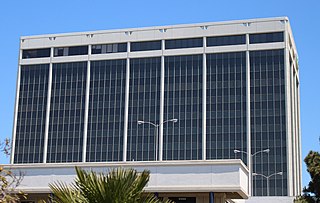
Gracenote, Inc. is a company and service that provides music, video and sports metadata and automatic content recognition (ACR) technologies to entertainment services and companies, worldwide. Formerly CDDB, Gracenote maintains and licenses an Internet-accessible database containing information about the contents of audio compact discs and vinyl records. From 2008 to 2014, it was owned by Sony, later sold to Tribune Media, and has been owned since 2017 by Nielsen Holdings.
Lala was an online music store created by Silicon Valley entrepreneur Bill Nguyen. The service allowed members to legally create online shareable "playlists" of their own uploaded music which could play full length songs for other registered Lala members, purchase MP3s, stream music on a one-time basis or as inexpensively purchased "web songs," buy new CDs from the Lala store, leave blurbs on other members' pages, and participate in the community forums. Lala contracted with major labels and offered a large catalog of albums to stream or purchase. Their home page claimed over 8 million licensed songs available.
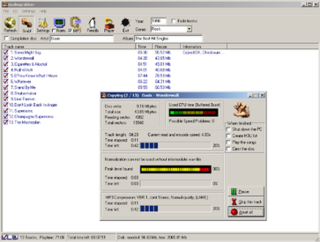
Audiograbber is a proprietary freeware CD audio extractor/converter program for Microsoft Windows. It was one of the first programs in the genre to become popular. The data extraction algorithm was designed by Jackie Franck and was included in the Xing Technology software package Xing Audio Catalyst in the mid-1990s.
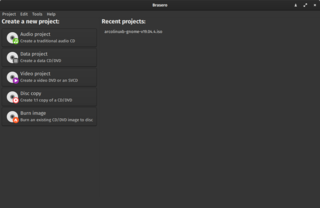
Brasero is a free and open-source disc-burning program for Unix-like operating systems, it serves as a graphical front-end to cdrtools, cdrskin, growisofs, and (optionally) libburn. Licensed under the terms of the GNU General Public License.
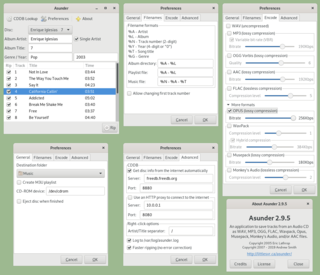
Asunder is a free and open-source graphical audio CD ripper program for Unix-like systems. It doesn't have dependencies to the GNOME libraries or libraries of other desktop environments. It functions as a front-end for cdparanoia.
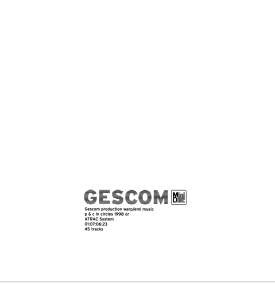
Minidisc is the first album by Gescom. The album was originally only released in MiniDisc format, but was later pressed to CD. In addition, the album has been released on bleep.com. The personnel for this album were Sean Booth and Rob Brown, and Russell Haswell.
CDDB, short for Compact Disc Database, is a database for software applications to look up audio CD information over the Internet. This is performed by a client which calculates a (nearly) unique disc ID and then queries the database. As a result, the client is able to display the artist name, CD title, track list and some additional information. CDDB is a licensed trademark of Gracenote, Inc.

A CD-ROM is a type of read-only memory consisting of a pre-pressed optical compact disc that contains data. Computers can read—but not write or erase—CD-ROMs. Some CDs, called enhanced CDs, hold both computer data and audio with the latter capable of being played on a CD player, while data is only usable on a computer.
Music information company Gracenote changed its database terms to closed-source in 2001. This caused some controversy because Gracenote's ancestor, CDDB, had previously said its database was released under the GPL.
References
- 1 2 Stutzbach, Alisa Rata (2011). "Review of MusicBrainz". Notes. 68 (1): 147–151. ISSN 0027-4380.
- 1 2 3 4 Haas, Karl-Gerhard (2020-06-23). "CD-Datenbanken: freedb ist tot, es leben die Alternativen!". heise online (in German). Retrieved 2023-12-10.
- ↑ joerg (2006-04-24). "Massive duplicate cleanup completed". freedb. Archived from the original on 2006-05-10. Retrieved 2006-05-09.
- 1 2 Kaye, Robert (2007-06-25). "FreeDB → MusicBrainz gateway now available!". MusicBrainz. Retrieved 2007-07-10.
- ↑ "Freedb gateway: End of life notice, March 18, 2019". MetaBrainz Blog. 2018-09-18. Retrieved 2020-02-12.
- 1 2 "Why freedb.org?". freedb. Archived from the original on 2006-07-05. Retrieved 2006-05-09.
- ↑ Van Buskirk, Eliot (2006-11-13). "Gracenote Defends Its Evolution". Wired. ISSN 1059-1028 . Retrieved 2023-12-10.
- ↑ "Tips on using CD Trustee - Classical music". CD Trustee. Sane Soft, LLC. Archived from the original on 2008-06-06.
- ↑ Brown, Stan (2016-12-18). "Taming iTunes & iPod for Classical Music (and Non-Classical Too)". Oak Road Systems.
- ↑ kaiser (2006-10-04). "[MAGIX acquires] freedb.org". freedb. Archived from the original on 2007-03-03. Retrieved 2006-10-05.
- ↑ "Freedb gateway: End of life notice, March 18, 2019". 18 September 2018.
- ↑ "A new home for the freedb.org database to make sure it stays free" . Retrieved 2020-07-13.
Now 14 years later we have seen that Magix the owner of freedb.org has decided to take the cddb service on freedb down. As we stated in 2006 on gnudb.org "A new home for the freedb.org database to make sure it stays free.", we now have to stay to our promise and do our best to make sure it is available for all the music lovers.